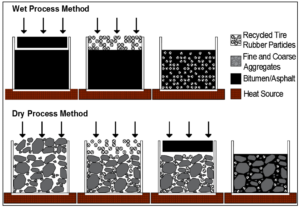Tyre manufacturer Group Michelin and French biochemicals company Carbios S.A. have developed polyester tyre fibres from polyethylene terephthalate (PET) plastic and textile waste.
The companies say they have advanced tyre sustainability efforts with the innovation.
Michelin explains it has ‘successfully tested and applied’ Carbios’ enzymatic recycling process for PET plastic waste, in order to create a “high-tenacity tyre fibre that meets its technical requirements”.
Carbios’ recycling process uses an enzyme capable of depolymerizing the PET contained in various plastics or textiles, including polyester clothing and bottles.
Unlike mechanically recycled PET, the monomers resulting from Carbios’ process can be repolymerized to achieve the high-performance grade required for pneumatic applications, Michelin adds.
“The technical fibre obtained is of the same quality as the one from virgin PET, processed with the same prototype installations,” the company says.
The high-tenacity polyester is particularly suitable for tyres, due to its breakage resistance, toughness and thermal stability, Michelin continues.
“We are very proud to be the first to have produced and tested recycled technical fibres for tyres,” comments Nicolas Seeboth, director of polymer research at Michelin.
Michelin has not elaborated on how or to what extent it has tested fibres produced with Carbios’ materials or how it will proceed with their production.
The new tyre application for the materials brings Michelin one step closer to its sustainable ambitions. It aims to source 40% of its tyre materials sustainably (from renewable or recycled origin) by 2030 and 100% by 2050.
According to Michelin, 1.6 billion car tyres are sold worldwide annually, consuming 800,000 metric tons of PET per year.
“When applied to Michelin, this represents nearly three billion plastic bottles per year that could be recycled into technical fibres for use in the company’s tyres,” the company says.
Alain Marty, Carbios’ chief scientific officer, notes: “In 2019, Carbios announced it had produced the first PET bottles with 100% purified terephthalic acid, made from the enzymatic recycling of post-consumer PET waste. Today, with Michelin, we are demonstrating the full extent of our process by obtaining from this same plastic waste, recycled PET that is suitable for highly technical fibres, such as those used in Michelin’s tyres.”
The technical fibre obtained is of the same quality as the one from virgin PET, processed with the same prototype installations. This high tenacity polyester is particularly suitable for tyres, due to its breakage resistance, toughness, and thermal stability, Carbios says.
This innovation marks the first time these recycled technical fibres have been used to manufacture tyres. Other areas of the textile industry such as the apparel and footwear industries have been using recycled PET to create garments and trainers such as the Nike Flyknit range and the Converse Renew range.
www.wtin.com


